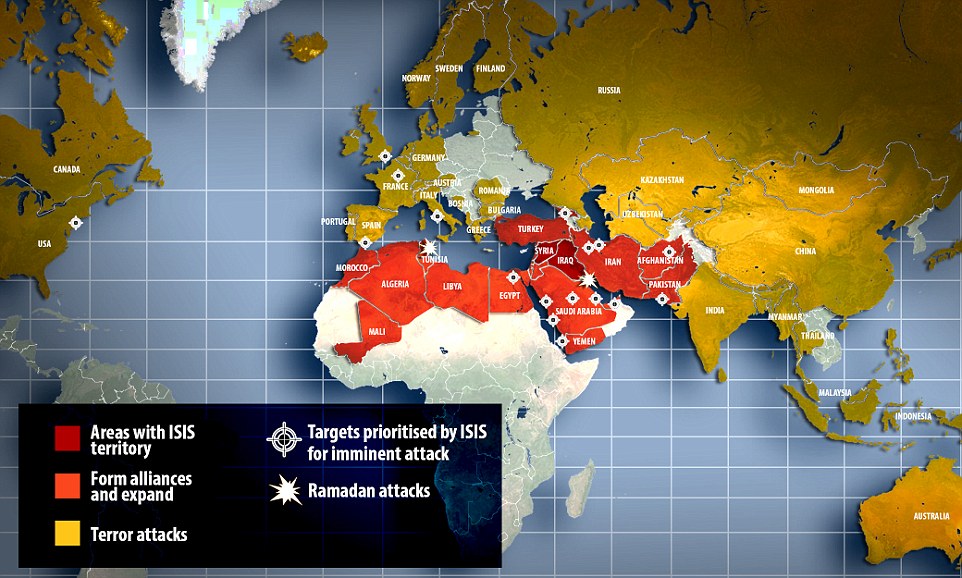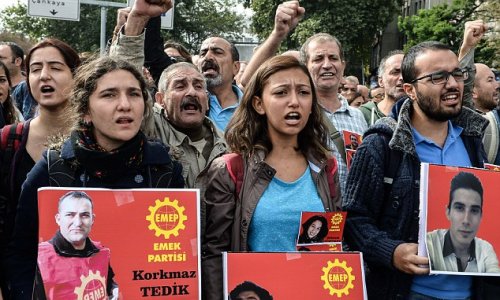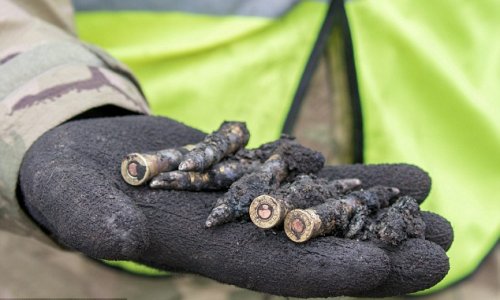ISIS will mark the holy month of Ramadan and the first anniversary of its self-imposed caliphate by launching bloody terror attacks on the West and activating 'terror cells' in countries as far as the Philippines, respected terrorism analysts have predicted.
It already controls large swathes of land across Iraq, Syria and Libya - where over eight million people live under the terror group's brutal regime - and has formed partnerships with other extremist groups across the Middle East and north Africa.
Now the terror group will capitalise on religious tension and war to plunge as much of the world into chaos as it can by July 18, the Institute for the Study of War (ISW) says.
In its report, 'ISIS Military Operations during Ramadan' which was published on June 7, it correctly predicted ISIS would execute a 'mass casualty attack' in Tunisia, which has become a 'breeding ground' for the extremists in recent years.
It also said Islamic State - which is a Sunni Muslim extremist group - would target Shia mosques in the Middle East.
As 38 people were being gunned down on a Tunisian beach on Friday, a suicide bomb attack massacred 27 innocent worshipers and injured 200 others at a Shia mosque in Kuwait.
'These attacks came days after ISIS spokesman Abu Muhammad al-Adnani urged its followers to launch attacks during Ramadan, as death this month is considered more valuable than in other months,' an ISW counter-terrorism analyst told MailOnline.
Harleen Ghambir added: 'We have been watching ISIS increasingly gain support among followers in Tunisia over the past few months, and that attack confirms that ISIS intends to use that support to encourage attacks against tourists and Western targets.'
As many as 2,400 Tunisians have joined ISIS on the battlefield in Iraq and Syria since 2011 and worryingly, 400 of them have since returned to the country, its Interior Ministry has said.
The country is almost entirely Muslim, but ISW also predicts that ISIS will mastermind 'lone wolf attacks' on countries with smaller Muslim populations like the UK, United States, Canada and Australia.
Its experts claim the countries ISIS has announced as targets are England, France, Italy, Spain, the United States, the Caucuses region of southern Russia, Algeria, Libya, Egypt, Iran, Yemen, Afghanistan and Pakistan.
Meanwhile dozens of other nations including Greece, Romania and Australia are at risk of deadly 'surprise attacks'.
Only last month, the UK's most senior counter-terrorism officer warned that half of the 700 British extremists who had gone to fight alongside Islamic State are now back in the country.
Assistant Commissioner Mark Rowley said: 'Islamic State and other terrorist groups are trying to direct attacks in the UK...
They are seeking, through propaganda, to provoke individuals in the UK to carry out violent attacks here.'
Islamic State's deadly network of jihadi groups in West Africa will 'continue efforts to plan explosive or mass casualty attacks... within Morocco, Tunisia, Algeria or southern Europe,' ISW says.
These ISIS-linked extremists 'may take advantage of refugee flows from Libya into Italy as a means for launching such an attack'.
There are fears the group could repeat a Tunisia-style attack, where gunman Seifeddine Rezgui opened fire on a beach packed with holiday makers, in the popular tourist country of Morocco.
Late last year, ISIS combatant Mohammed Hamdouch sent a message of terror to his native country by posing next to a crucified man - and threatening the Moroccan King and its government for supporting Saudi Arabia and Libya.
The man who goes by the nom de guerre Abu Jandal Al-Maghribi also threatened that Morocco 'will soon host training camps for ISIS combatants'.
The north African nation, which greeted more than 10million foreign visitors in 2013, has seen over 1,000 of its countrymen join ISIS in Syria, according to Middle East analysts Al Monitor.
It added: 'A major fighting brigade consisting almost entirely of Moroccans has participated in the intense and fierce battles in Syria, and its popularity keeps growing.
'The participation of fighters in Syria puts them at risk for bloody deaths and raises concerns about their return after having participated in a civil war.'
ISW also said Islamic State's partners would take advantage of the ongoing war between the Yemeni government and the Iranian-backed Houthi militia to carry out 'brutal attacks' in the country.
Last night a car bombing in the country's capital Sana'a injured 35 people, including women and children, the Houthi-run Defence Ministry said. Islamic State today claimed responsibility for the blast which reportedly targeted a group of mourners near the city's military hospital.
In March, ISIS expanded its tentacles into Africa after Nigerian terror group Boko Haram pledged its loyalty to Islamic State. The extremists command as many as 10,000 fighters who have slaughtered hundreds since its formation in 2002.
And ISW predicted that ISIS's next move would be to expand into Europe by creating a new 'wilayat' - or province - in the Caucuses region of southern Russia, which includes Chechnya, Dagestan and Ingushetia.
The terror group spread its tentacles further around Europe after the Caucuses Emirate - a major terrorist group which commands 'as many as 15,000' in the region of southern Russia - pledged its allegiance to ISIS this month.
The leader of the group, which has carried out over 900 terrorist attacks on Russian soil since its formation in 2007, personally declared his loyalty to ISIS commander-in-chief Abu Bakr Al-Baghdadi.
'ISIS will likely also release propaganda messages aimed at China, Turkey, and Southeast Asian countries to gain recruits and to intimidate foreign governments... ISIS may even send emissaries to active jihadist groups in Malaysia, Indonesia, and the Philippines,' the report adds.
It says Islamic State will also awaken 'terror cells' inside relatively-untouched countries such as Indonesia, Malaysia and the Philippines - which have 'sizeable Muslim populations' - and order them to carry out bloody attacks within the next month.
More than 500 Indonesians have already joined ISIS on the battlefield in the Middle East and experts believe the 'history of extremism' in the country, home to 200 million Muslims, makes it a 'ripe location' for further recruitment.
Shockingly, a survey conducted by the Pew Research Centre discovered 72 per cent of Muslim Indonesians want shariah law to be implemented in the country.
Its leaders became so worried about the rise of extremism that they banned verbal support for ISIS, clamped down on overseas travel to support terror groups and revoked citizenship of those suspected of doing so.
The threat of extremism in nearby Malaysia became just as real following the release of a harrowing ISIS propaganda video in March, featuring young Malay boys brandishing weapons in front of the notorious black flag.
Almost 150 Malaysians have joined Islamic State in the Middle East and more than 100 individuals linked to the extremists have been arrested inside the country, according to a report by the Overseas Security Advisory Council.
Only in April, police foiled a deadly bomb attack in its capital Kuala Lumpur by arresting 12 people linked to the extremist group.
Among the explosive materials they seized were 20kg of ammonium nitrate, 20kg of potassium nitrate and two litres of kerosene, two remote controls, batteries and two remote controls.
The Prime Minister of neighbouring Singapore has said 'it is not so far-fetched that ISIS could establish a base somewhere in the region'.
He gave the shocking example of a 19-year-old who was detained after threatening to assassinate government leaders if he was not given permission to join ISIS in Syria.
Speaking late last month, he added: 'This is why Singapore takes terrorism, and in particular ISIS, very seriously.'
And the Philippines' Foreign Affairs Secretary believes Islamic State's threat to his country through the brutal Black Flag Movement - which declared its loyalty to ISIS leader Abu Bakr Al-Baghdadi - is 'real rather than imagined', PhilStar reported in April.
In September last year, vile Islamists in the country threatened to kill two German hostages if their nation did not pay ransom and withdraw its support for the United-States' operation in targeting ISIS in Syria and Iraq.
The Abu Sayyaf terror group released images of 71-year-old man known as Stefan O and 55-year-old Henrike D on their knees in a jungle area of the Philippines while masked extremists held a knife to Stefan's neck.
(dailymail.co.uk)



www.ann.az
Follow us !











